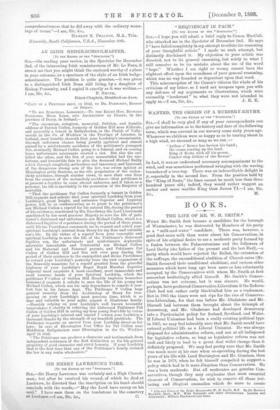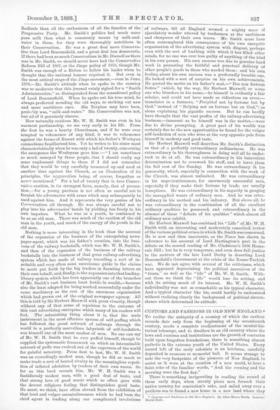BOOKS.
THE LIFE OF MR, W. H. SMITH.* WHEN Mr. Smith first became a candidate for the borough. of Westminster, he was distrusted by Members of his party as a " milk-and-water " candidate. There was, however, a good deal more milk than water about his Conservatism, in spite of his original desire to see a moderate party formed by a fusion between the Palmerstonians and the followers of Lord Derby (the father of the present and the last Earl),—a party which would have rejected the Ballot, the extension of the suffrage, the unconditional abolition of Church-rates (Mr.. Smith favoured their conditional abolition), and various other measures whioh have long ago been more or less reluctantly accepted by the Conservatives with whom Mr. Smith at first somewhat hesitatingly allied himself. Mr. Smith's Comer-. vatism was not extreme, but it was sincere. He would, perhaps, have preferred Conservative-Liberalism if the Reform. Club had not rather early blackballed him as a tradesman.. But in 1865 the times were not ripe for the rise of Conserva- tive-Liberalism, for that was before Mr. Gladstone and Mr-. Disraeli had between them brought about the triumph of democracy, and Mr. Gladstone had developed democracy' into a Particularist policy for Ireland, Scotland, and Wales.. If Liberal Unionism had been a really existing political type in 1865, we may feel tolerably sure that Mr. Smith would have. entered political life as a Liberal Unionist. He was always disposed for administrative reform, and not at all indisposed, for legislative reform, so long as legislative reform was not rash and likely to lead to a great deal wider change than it definitely proposed. We may feel pretty sure that Mr. Smith, was much more at his ease when co-operating during the last. years of his life with Lord Hartington and Mr. G-oschen, than he was in 1878, when he felt himself compelled to support a policy which had in it more Jingoism than Conservatism. He was a born moderate. But all moderates are genuine Con- servatives, though they may emphasise that most essential. element of Conservatism, its wish to remove all those irri- tating and illogical anomalies which do more to create.
* Life and Timm of the Right Honourable W. H. Smith, ALP. By Sir Herbert Maxwell, Bart., M.P. With Portraits and other Illustrations. Loudon oani Edinburgh ; William Blackwood and Sons. Radicals than all the enthusiasm of all the fanatics of the Progressive Party. Mr. Smith's politics had much more pure milk than what is commonly meant by milk-and- water in them, for they were thoroughly nutritious in their Conservatism. He was a great deal more Conserva- tive than Lord Beaconsfield, and a great deal less democratic. If there had been as much Conservatism in Mr. Disraeli as there was in Mr. Smith, we should never have had the Conservative Reform Bill of 1867, or the Jingo policy of 1876, though Mr. Smith was enough of a Briton to follow his leader when be thought that the national honour required it. But even in the most critical stage of the Jingo movement,—even in June, 1879,—Mr. Smith's attitude when he spoke in the country was so moderate that this journal vainly sighed for a "Smith Administration," as distinguished from the sensational policy of Lord Beaconsfield. When he spoke out his true mind, he always preferred mending the old ways, to striking out new and more ambitious ones. His Toryism may have been, probnbly was, "milk-and-water." His Conservatism was not, but all of it genuinely sincere.
How naturally cautious Mr. W. H. Smith was even in his warmest partisanship, we see very early in his life. From the first he was a hearty Churchman, and if he were ever tempted to vehemence of any kind, it was to vehemence against the forms of dissent with which his father's Wesleyan connections familiarised him. Yet he writes to his sister most characteristically when he was only a lad of twenty, concerning the annoyance the Wesleyans gave him :—" I am sometimes so much annoyed by these people, that I should really say some unpleasant things to them if I did not remember that they would be very carefully treasured up and used at another time against the Church, as an illustration of its principles, the aggravation being, of course, forgotten or never mentioned." For alad of twenty that is true Conser- vative caution, in its strongest form, namely, that of precau- tion ;—for a young partisan is not often so careful not to furnish his adversaries with arms which may subsequently be used against him. And it represents the very genius of his Corservatism all through. He was always careful not to play into his adversaries' hands by yielding too freely to his own impulses. What he was as a youth, he continued to be as an old man. There was much of the caution of the old man in the youth, and much of the energy of the youth in the old man.
Nothing is more interesting in the book than the account of the expansion of the business of the enterprising news- paper-agent, which was his father's creation, into the busi- ness of the railway bookstall's, which was Mr. W. H. Smith's, and then of the expansion of the business of the railway bookstalls into the business of that great railway-advertising system which has made of railway travelling a sort of in- evitable and very often most unwelcome guide to the claims to merit put forth by the big traders in flaunting letters on their own behalf; and, finally, to the expansion into that lending- library system which has been apparently one of the branches of Mr. Smith's vast business least fertile in wealth,—because also the least adapted for being worked successfully under the same machinery as the rest of the enormous organisation which had grown out of the original newspaper agency. All this is told by Sir Herbert Maxwell with great vivacity, though without any of that sense of repulsion to the outcome of this vast advertising enterprise which many of his readers will feel. The astonishing thing about it is, that the main instrument in the most effective system of self-puffing which has followed the great network of railways through the world in a perfectly marvellous labyrinth of self-laudation, was himself one of the most modest of men. No one can say of Mr. W. H. Smith that be ever puffed himself, though he supplied the systematic framework on which an interminable network of puffs was evolved out of the eagerness of the world for gainful notoriety. From first to last, Mr. W. H. Smith was an exceedingly modest man, though he did so much to make trade a sort of heated rivalry in the meaningless repeti- tion of inflated adulation by traders of their own wares. So far as this book reveals him, Mr. W. H. Smith was a fastidiously modest man, with a good deal of taste, and that strong love of good music which so often goes with the devout religious feeling that distinguishes good taste. He must, we think, have often shrunk from the exhibition of that loud and vulgar ostentatiousness which he had been the chief agent in leading along our complicated involutions of railways, till all England seemed a mighty maze of ejaculatory wonder uttered by tradesmen at the usefulness and cheapness of their own wares. Mr. Smith must have often contemplated this consequence of his own energetic organisation of the advertising system with disgust, perhaps even with the sort of loathing with which it has filled other minds, for no one was ever less guilty of anything of the kind in his own person. His own success was due to genuine hard work in promoting the faithful and punctual delivery of other people's goods to those who needed them ; and his own feeling about his own success was a profoundly humble one. He looked with a sort of surprise on his own achievements. He quoted the motto on his father's seal,—" Deo non fortunit, fretus " (which, by the way, Sir Herbert Maxwell, or some one who blunders in his name,—he himself is evidently a fair scholar, and could not have made so ridiculous an error,— translates in a footnote, "Freighted not by fortune but by God," instead of "Relying not on fortune but on God,") as alone explaining his gigantic success. But he can hardly have thought that the vast profits of the railway-advertising business,—innocent as he himself was in the matter,—were due to divine prompting. A great part of his wealth was certainly due to the new opportunities he found for the vulgar self-laudation of men who viere at the very opposite pole from himself in modesty and good taste.
Sir Herbert Maxwell well describes Mr. Smith's distinction as that of a perfectly extraordinary ordinariness. He was extraordinary in his thoroughness in doing well all he under- took to do at all. He was extraordinary in his benevolent determination not to overwork his staff, and to leave ,them the full rest of the Sunday. He was extraordinary iA his generosity, which, especially in connection with the work of the Church, was almost unlimited. He was extraordinary in his unpretentiousness, for enormously successful men, especially if they make their fortune by trade, are usually bumptious. He was extraordinary in his sagacity in gauging the unsupplied wants of ordinary men. And he was extra- ordinary in his method and his industry. But above all, he was extraordinary in the combination of all the excellent ordinary qualities he possessed, and extraordinary in the absence of those "defects of his qualities" which almost all ordinary men exhibit.
Sir Herbert Maxwell has combined his " Life " of Mr. W. H. Smith with an interesting and moderately conceived review of the various political crises in which Mr. Smith was ooncerned. He is now and then inaccurate, as the Times has shown in reference to his account of Lord Hartington's part in the debate on the second reading of Mr. Gladstone's 1886 Home.. rule Bill ; but he is very temperate, and even does full justice to the motives of the late Lord Derby in deserting Lord Beaconsfield's Government at the crisis of the Russo-Turkish war. We do not agree with several of the criticisms, which have appeared depreciating the political narratives of the "times," as well as the " life " of Mr. W. H. Smith. With- out them we think the "life" would lose its setting, and with its setting much of its interest. Mr. W. H. Smith's individuality was not so remarkable as his typical character. And a typical character like his, could hardly be understood without realising clearly the background of political circum- stance which determined its attitude.







































 Previous page
Previous page